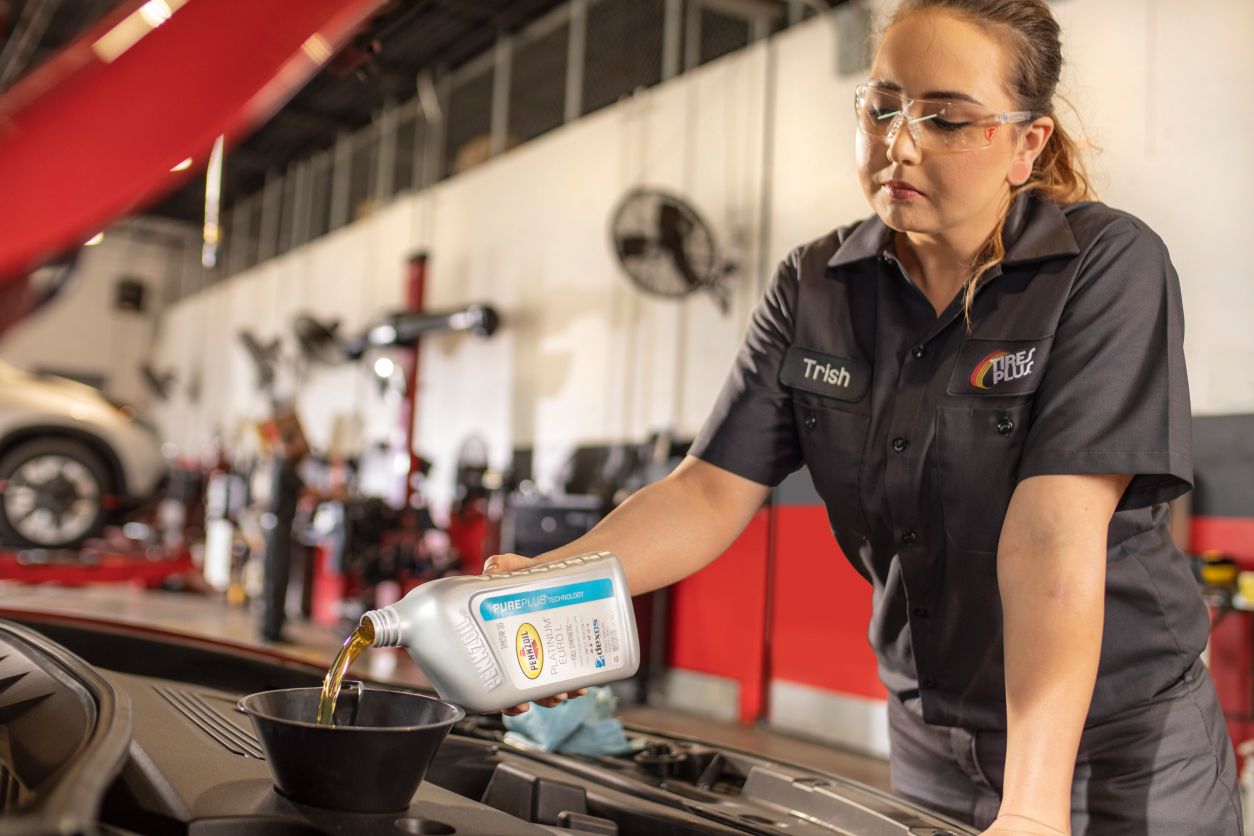You know that motor oil keeps your engine lubricated and running smoothly. But what happens when you’re running low on oil and all the gas station carries is synthetic? Can you mix synthetic oil with regular oil (or vice versa)? It can’t be worse than running your engine with low oil, right?
Keep reading to answer those questions and more! We’ll explain what happens when you combine synthetic and conventional oils, whether mixing engine oil types, brands, or viscosities is safe, and why getting professional help when switching from one motor oil type to another might be the smartest move.
Note: Mentions of "regular oil" throughout this article refer to conventional oil options.
SO, CAN YOU MIX SYNTHETIC OIL WITH CONVENTIONAL OIL?
The short answer is… yes. The only exceptions were some older Mazda rotary engines that explicitly said not to use synthetic oils in their Owner's Manual..
Modern motor oils are designed to be chemically compatible, so mixing them is typically not an issue. However, each individual oil should be of the correct viscosity and quality/performance rating to comply with your owner's manual. With that said, it’s best to stick with the oil type and oil change intervals recommended by your car's manufacturer.
WHAT ARE THE DIFFERENT TYPES OF CAR ENGINE OIL?
Don’t worry, we’ll dive into the not-so-nitty-gritty of proper engine lubrication in a moment. But before we do, let’s cover the different types of oil you can choose for your vehicle. You might be surprised to learn that it’s not as simple as synthetic vs conventional.
- Conventional: This is standard or “traditional” petroleum-based oil, commonly used in older engines that operate under standard driving conditions. It tends to be the cheapest option and is formulated to provide basic lubrication and protection.
- Synthetic Blend: This oil combines conventional and synthetic oils, balancing cost and performance. It generally provides more protection from rust and oxidation than purely conventional oils but may not offer the same lubricative performance as full synthetic oil.
- Full Synthetic: This type of oil is often used in high-performance or forced induction (turbocharged and supercharged) engines, as it is typically chemically engineered to be the best possible oil at the molecular level. Many synthetic oils are formulated to clean your engine as they circulate and offer exceptional lubrication and rust protection at the same time. Best of all, they can operate effectively at high and low temperatures — offering reliable performance throughout your entire drive.
- High-Mileage: Formulated with specific additives and base oils, high-mileage oil is designed to protect and extend the life of engines with over 75,000 miles. It helps reduce oil consumption, leaks, and engine wear — keeping your oldie a goodie for as long as possible. This type of oil typically comes in synthetic blends and fully synthetic varieties.
MIXING ENGINE OIL TYPES: FAQS
What Happens if You Add Synthetic Oil to Regular Oil?
If you’re mixing synthetic and conventional oils, aren’t you just making a homemade synthetic blend? Not quite. Each oil used must have the correct viscosity and quality/performance rating.
Assume each oil meets the right specs, the bottom line is that mixing synthetic and conventional oil likely dilutes the performance of the synthetic oil. Reducing the effectiveness of a top-tier oil like Pennzoil Full Synthetic, the first oil made from natural gas, would be a travesty.
Can You Mix Engine Oil Brands?
Yes, as long as each oil meets the correct viscosity and quality/performance rating.
Can You Mix Oil Weights?
Mixing oil weights is not recommended.
If you’ve ever bought oil, you probably noticed that it comes in various viscosities — also called grades or weights — like 10W-30 or 5W-20. Though you may be able to use different types of oil, like conventional and synthetic, it’s not advisable to mix different grades. Doing so can result in unpredictable final viscosities.
If your oil weight is incompatible with your engine, it can result in inadequate lubrication, excessive friction, accelerated wear, and, ultimately, engine damage. Our recommendation? Always consult your owner’s manual for the correct viscosity grade and performance recommendation required for your vehicle.
Should You Top-Off Your Car’s Oil?
Occasionally yes, but not for prolonged periods.
Many people think that topping off their motor oil in between oil changes can help keep it clean and usable for longer — this is often how motor oil types get mixed.
While you should top off your oil if it is low, topping it off to prolong oil life generally isn’t the best idea. Adding fresh oil to old is kind of like using dry shampoo — it might absorb impurities, but it’s not making things any cleaner.
It’s also worth noting that if you consistently need to top off low oil, your engine could be burning or leaking oil — issues that can lead to low oil pressure and, ultimately, engine damage. If this is the case, we recommend bringing your vehicle to your nearest Tires Plus. Our qualified technicians can find the source of the problem and repair your engine to get your vehicle back where it belongs — on the road.
THINKING ABOUT SWITCHING ENGINE OIL TYPES?
Are you thinking about changing to a different type of motor oil? Switching is easy! Visit your nearest Tires Plus location and ask for an oil change with the Pennzoil oil of your choice. If you're not sure what kind of oil might be best for your car, our certified technicians are ready to answer all your questions. Schedule an appointment today!



